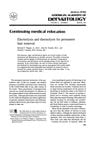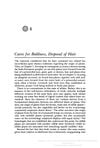January 2021 in “Hair therapy & transplantation” Combining PRF and PDO threads shows promise in treating male pattern baldness.
 76 citations,
March 2005 in “Journal of Molecular Medicine”
76 citations,
March 2005 in “Journal of Molecular Medicine” Certain mice without specific receptors or mast cells don't lose hair from stress.
 April 1998 in “Journal of women's health”
April 1998 in “Journal of women's health” Hair loss in women is often due to hereditary conditions or stress, and while treatments like minoxidil can help, diagnosis and management require medical guidance.
 58 citations,
March 1985 in “Journal of The American Academy of Dermatology”
58 citations,
March 1985 in “Journal of The American Academy of Dermatology” The document concludes that electrolysis and thermolysis can permanently remove hair but calls for better regulation to ensure safety, and notes a possibility of hair regrowth and rare complications.
 31 citations,
May 2008 in “Drug Discovery Today: Disease Mechanisms”
31 citations,
May 2008 in “Drug Discovery Today: Disease Mechanisms” Different hair growth problems are caused by genetic issues or changes in hair growth cycles, and new treatments are being developed.
 25 citations,
May 2020 in “Progress in Organic Coatings”
25 citations,
May 2020 in “Progress in Organic Coatings” Castor oil-based polyurethanes are promising for making safe, strong-performing, eco-friendly hair-styling products.
 21 citations,
July 2014 in “British Journal of Dermatology”
21 citations,
July 2014 in “British Journal of Dermatology” Hair thickness matters more than density for baldness in Japanese men over 25.
 10 citations,
December 2019 in “International journal of medicinal chemistry”
10 citations,
December 2019 in “International journal of medicinal chemistry” Chemicals from the plant Dicerocaryum senecioides were found to safely speed up and increase hair growth in mice.
 9 citations,
June 2020 in “Tissue Engineering and Regenerative Medicine”
9 citations,
June 2020 in “Tissue Engineering and Regenerative Medicine” HHORSC exosomes and PL improve hair growth treatment outcomes.
 5 citations,
November 2011 in “Expert Review of Dermatology”
5 citations,
November 2011 in “Expert Review of Dermatology” The document concludes that early diagnosis and a comprehensive treatment plan are crucial for managing hair loss in children, with a focus on both medical and psychological support.
 3 citations,
January 2012 in “Wageningen Academic Publishers eBooks”
3 citations,
January 2012 in “Wageningen Academic Publishers eBooks” Hair health depends on various factors and hair loss can significantly affect a person's well-being; understanding hair biology is key for creating effective hair care treatments.
 December 2023 in “Aesthetic Cosmetology and Medicine”
December 2023 in “Aesthetic Cosmetology and Medicine” COVID-19 can cause hair loss, but specialists can help treat it.
 February 2014 in “Harvard University Press eBooks”
February 2014 in “Harvard University Press eBooks” The document describes how hair and plants are symbolically linked in Indo-European traditions, leading to practices like burying hair to promote plant growth and using plants to treat baldness.
 December 2018 in “Journal of harmonizrd research in applied science”
December 2018 in “Journal of harmonizrd research in applied science” Yoga and Ayurveda, including stress management and herbal oil use, can potentially reduce hair loss and promote hair growth, with further research needed for therapy protocols.
 184 citations,
December 2018 in “Nature Communications”
184 citations,
December 2018 in “Nature Communications” Researchers created human hair follicles using a new method that could help treat hair loss.
 127 citations,
December 2005 in “Experimental Dermatology”
127 citations,
December 2005 in “Experimental Dermatology” Stress can stop hair growth in mice, and treatments can reverse this effect.
 125 citations,
September 2001 in “The FASEB Journal”
125 citations,
September 2001 in “The FASEB Journal” Stress can cause hair loss by negatively affecting hair follicles and this effect might be reversed with specific treatments.
 114 citations,
January 2007 in “Drug Safety”
114 citations,
January 2007 in “Drug Safety” Some drugs can cause skin, nail, and hair problems, which are important for healthcare professionals to recognize and report.
 102 citations,
December 2017 in “The journal of investigative dermatology. Symposium proceedings/The Journal of investigative dermatology symposium proceedings”
102 citations,
December 2017 in “The journal of investigative dermatology. Symposium proceedings/The Journal of investigative dermatology symposium proceedings” Restoring hair bulb immune privilege is crucial for managing alopecia areata.
 83 citations,
June 2020 in “Materials & Design”
83 citations,
June 2020 in “Materials & Design” Sponge helps heal wounds faster with less inflammation and better skin/hair growth.
 66 citations,
February 2013 in “Pediatric Dermatology”
66 citations,
February 2013 in “Pediatric Dermatology” Dermoscopy improves diagnosis and treatment monitoring for children's skin infections, inflammations, and hair disorders.
 61 citations,
September 2020 in “Bioactive Materials”
61 citations,
September 2020 in “Bioactive Materials” A special dressing called FEA-PCEI can speed up wound healing, reduce scars, and help grow new hair follicles, but only at the right dosage.
 47 citations,
January 2017 in “RSC Advances”
47 citations,
January 2017 in “RSC Advances” Keratin peptides can change hair shape gently without harsh chemicals.
 40 citations,
May 2016 in “Proceedings of the National Academy of Sciences of the United States of America”
40 citations,
May 2016 in “Proceedings of the National Academy of Sciences of the United States of America” Changes in keratin make hair follicles stiffer.
 37 citations,
January 1997 in “Clinics in Dermatology”
37 citations,
January 1997 in “Clinics in Dermatology” Hair problems are common and distressing for women, but increasing knowledge of treatments offers hope.
 29 citations,
March 2008 in “Postcolonial Studies”
29 citations,
March 2008 in “Postcolonial Studies” The article concludes that the global hair trade is exploitative and reflects complex cultural and economic issues.
 27 citations,
March 2013 in “Social Semiotics”
27 citations,
March 2013 in “Social Semiotics” Commercial hair loss websites promote Propecia by making men feel insecure about baldness and suggesting it's a medical issue needing treatment.
 19 citations,
June 2021 in “Tissue Engineering and Regenerative Medicine”
19 citations,
June 2021 in “Tissue Engineering and Regenerative Medicine” Fat stem cell particles help regrow hair.
 16 citations,
December 2006 in “Expert Review of Dermatology”
16 citations,
December 2006 in “Expert Review of Dermatology” Hair follicles are essential for skin health, aiding in hair growth, wound healing, and immune function.
 14 citations,
November 2020 in “International Journal of Biological Macromolecules”
14 citations,
November 2020 in “International Journal of Biological Macromolecules” Mushroom-based scaffolds help heal skin wounds and regrow hair.




























